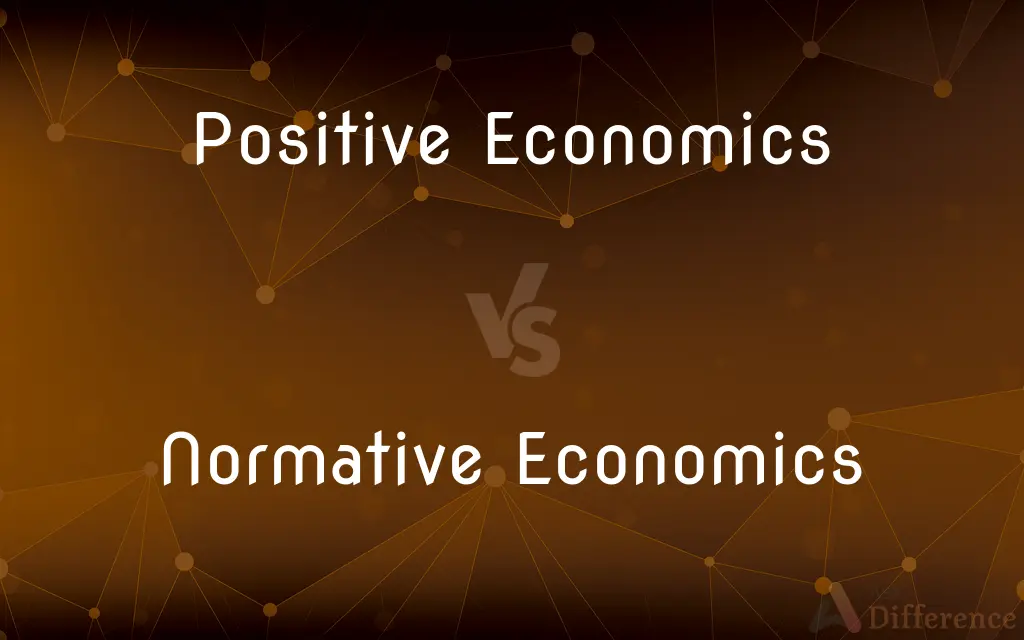Positive Economics vs. Normative Economics — What's the Difference?
Edited by Tayyaba Rehman — By Fiza Rafique — Published on December 30, 2023
Positive Economics describes "what is" in economic phenomena, while Normative Economics deals with "what ought to be."

Difference Between Positive Economics and Normative Economics
Table of Contents
ADVERTISEMENT
Key Differences
Positive Economics is primarily concerned with understanding and explaining economic behaviors and phenomena as they exist. It relies on factual data, objective analysis, and empirical methods to describe economic situations without making value judgments. By observing and analyzing data, Positive Economics provides a framework for understanding how economies operate. For example, if unemployment rises, Positive Economics would seek to explain the causes behind the increase.
Contrastingly, Normative Economics is rooted in value judgments, opinions, and beliefs about what the economy should look like. It delves into the realm of the ideal, suggesting policies or actions based on what is considered right, fair, or desirable. Unlike Positive Economics, which presents facts, Normative Economics offers recommendations. For instance, in response to rising unemployment, Normative Economics might argue for specific policy interventions, based on what is perceived as just or beneficial.
A key distinction lies in the inherent subjectivity of Normative Economics versus the objectivity of Positive Economics. While the former is prescriptive, advocating for particular economic outcomes, the latter is descriptive, presenting things as they are. One might say that Positive Economics provides the raw data and insights, while Normative Economics builds upon these to propose directions for the future.
Both Positive and Normative Economics have essential roles in the broader field of economics. While Positive Economics equips policymakers with a clear understanding of current conditions and trends, Normative Economics guides decisions based on societal values and goals.
Comparison Chart
Focus
Describes "what is."
Deals with "what ought to be."
ADVERTISEMENT
Nature
Objective and factual.
Subjective and value-based.
Method
Empirical, based on data.
Prescriptive, based on beliefs and opinions.
Outcome
Observations and explanations.
Recommendations and policy suggestions.
Role in Economics
Provides insights into current conditions.
Guides decisions based on societal values and goals.
Compare with Definitions
Positive Economics
Positive Economics answers "what" and "why."
Positive Economics explained why the housing market crashed.
Normative Economics
Normative Economics prescribes solutions.
Based on Normative Economics, the report recommended raising the minimum wage.
Positive Economics
Positive Economics is fact-based.
Positive Economics found that tax cuts led to increased consumer spending.
Normative Economics
Normative Economics involves judgments.
Normative Economics suggested that universal healthcare would be just and fair.
Positive Economics
Positive Economics observes and describes.
Through Positive Economics, we learned how inflation impacts consumer behavior.
Normative Economics
Normative Economics is value-laden.
Normative Economics argued for progressive taxation to reduce income inequality.
Positive Economics
Positive Economics relies on empirical methods.
Using Positive Economics, researchers quantified the effects of trade barriers.
Normative Economics
Normative Economics focuses on "should" statements.
Normative Economics claimed that governments should prioritize environmental protection.
Positive Economics
Positive Economics is value-neutral.
Positive Economics presented the data without suggesting any policy changes.
Normative Economics
Normative Economics guides policy decisions.
Through Normative Economics, the committee advocated for stronger antitrust laws.
Common Curiosities
What is Positive Economics?
It's the study of economics based on objective analysis of "what is" without making value judgments.
Is Normative Economics subjective?
Yes, it's based on opinions and beliefs about what the economy should be like.
Can Normative Economics be proven right or wrong?
No, it's based on values and beliefs, making it inherently subjective.
Are value judgments present in Positive Economics?
No, Positive Economics is value-neutral and objective.
Does Positive Economics suggest policy changes?
No, it merely observes and explains, while Normative Economics suggests policies based on values.
Why is Positive Economics important?
It provides a clear understanding of economic conditions and trends based on factual data.
Which is more empirical, Positive or Normative Economics?
Positive Economics is more empirical as it's based on data and observations.
Why might two economists have different Normative views?
Their personal values, beliefs, and opinions might differ.
How does Normative Economics differ from Positive Economics?
Normative Economics offers recommendations based on values, while Positive Economics describes economic phenomena as they are.
How do policymakers use Normative Economics?
They use it to guide decisions based on societal values and desired outcomes.
Do economists always agree on Positive Economics findings?
While there's more consensus in Positive Economics, disagreements can still arise based on data interpretation.
Can Positive Economics influence Normative Economics?
Yes, the insights from Positive Economics can serve as a foundation for Normative recommendations.
Is Normative Economics essential?
Yes, it helps shape policies and decisions based on societal goals.
Does every economic scenario have both Positive and Normative aspects?
Often yes, with Positive explaining the scenario and Normative suggesting what actions to take.
Is Positive Economics purely factual?
While it aims to be, interpretation and analysis can introduce subjectivity.
Share Your Discovery

Previous Comparison
Glucogenic Amino Acids vs. Ketogenic Amino Acids
Next Comparison
Home Screen vs. WallpaperAuthor Spotlight
Written by
Fiza RafiqueFiza Rafique is a skilled content writer at AskDifference.com, where she meticulously refines and enhances written pieces. Drawing from her vast editorial expertise, Fiza ensures clarity, accuracy, and precision in every article. Passionate about language, she continually seeks to elevate the quality of content for readers worldwide.
Edited by
Tayyaba RehmanTayyaba Rehman is a distinguished writer, currently serving as a primary contributor to askdifference.com. As a researcher in semantics and etymology, Tayyaba's passion for the complexity of languages and their distinctions has found a perfect home on the platform. Tayyaba delves into the intricacies of language, distinguishing between commonly confused words and phrases, thereby providing clarity for readers worldwide.














































